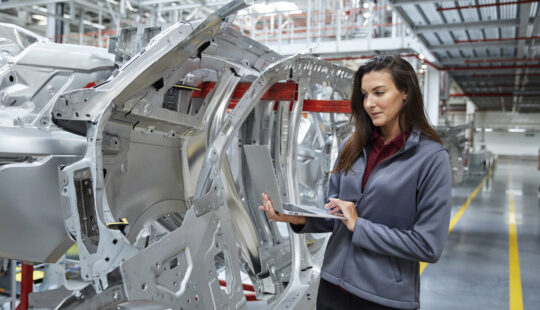“The only constant is change.” This has always been true for enterprise software. And agility, especially when it comes to the ability of software architecture to create and respond to change, is at the heart of reinventing business processes.
But one type of technology — machine-generated text, images, and media that mimic human creativity — is introducing an entirely new era of transformation. Known as generative artificial intelligence (AI), this technology has set off a wave of innovation that will dramatically change how businesses run. And at SAP, we are perfectly positioned to pioneer this business AI revolution.
What Sets SAP Apart?
Our access to business data, our understanding of the context of complex business processes, as well as our deep domain and industry expertise: these are incredible differentiators at this moment in time.
SAP Business AI is deeply embedded into applications and process flows that rely on a veritable treasure trove of decades of relevant business data curated from huge customer data sets. We have agreements with more than 25,000 customers to use their data to train our own models. Using this data to contextualize generative AI models results in very task-specific outcomes for business users.
Without this customer data, generative AI users get results that are more like dinner-table conversation than business-altering insights and responses. The data we use for context for our tenants are protected and used only for that tenant — they are not reused elsewhere.
For more than 50 years, customers have trusted us with their most mission-critical business processes and now that trust is crucial as we deliver business AI with the highest levels of concern for security, privacy, compliance, and ethics, which our customers have come to expect.
SAP Foundation Models: Our Differentiator
It is clear that the emergence of generative AI has completely changed the game. General-purpose foundation models can be adapted to many different tasks in a short time. Users can have simple interactions with models in their natural language, so they don’t need any technical knowledge to use AI. Additionally, large language models (LLMs) have gotten bigger and more accurate, with new versions being released all the time.
These changes have opened up huge opportunities for us to build even better AI for business, especially when we adapt LLMs to the SAP business context and create our own models using our structural data and business process knowledge.
That is why we are investing in building our own foundation models and combining them with our deep understanding of business processes and SAP data. Using our own foundation models, we can create powerful, context-specific outcomes for our customers. Our foundation models, which will also allow for fine-tuning for different scenarios, will further unlock and strengthen our leading position in embedded AI. Customers will benefit from high-performance models trained on rich SAP data, achieving better predictive results.
But customers don’t have to wait for these SAP foundation models to be ready before they can leverage context from business data because we are also using retrieval-augmented generation (RAG) to provide business data context and give customers better results right away.
With these foundation models in place, we will embed business capabilities powered by AI in every solution to enable new business models.
SAP’s Generative AI Assistant: Joule
The vision of SAP Business AI is to deliver the first true system of intelligence to fundamentally change the way companies operate, helping them create even more value, faster. Essentially, embedded AI will become the norm for powering business processes.
That’s why we announced that we will embed our new generative AI assistant Joule throughout the SAP cloud enterprise portfolio. Joule will help our customers achieve business results faster by enabling them to access insights that are relevant for their business through natural conversation.
By simply asking a question in plain language, our customers can get smart answers tapped from a pool of data from across the SAP portfolio and third-party sources. Joule will continuously deliver new insights that get even more intelligent over time. Imagine for example, asking Joule to prioritize suppliers based on their average margins and carbon footprint. Joule will handle some tasks completely, like writing job descriptions that are unbiased and compliant, or help to develop relevant interview questions and more.
Applying AI to Solve Specific Business Problems
The true value of business AI comes from knowing how to apply AI to solve specific business problems. Here are some more examples.
Decision-makers need intelligent recommendations based on connecting, understanding, and processing relevant information. Generative AI can produce those intelligent recommendations in seconds, if it is trained on relevant data in a manner equivalent to the ways humans would consider that data.
An HR manager can use generative AI to create a job description or interview questions and do this at scale. Generative AI can create thousands of responses in the time it takes a human to manually create one.
Or take financial reports: they typically require data to be extracted from complex systems. Generative AI can automate this time-consuming process and produce accurate reports quickly and simply.
When booking a trip, employees can receive offerings that are in line with company policies just by describing their travel requirements, such as destination and dates.
But the potential of generative AI extends far beyond content generation. Consider warehouses, where delivery notes need to be matched with orders. Generative AI can automate this process or provide detailed assistance to warehouse workers, reducing manual labor.
AI-optimized business processes can also help companies continuously optimize and improve efficiency. Instead of going through each time-consuming step to analyze, monitor, modify, and automate their processes, process owners can simply describe the type of improvements they want in natural language, removing any need to write code or understand a domain-specific language, and get immediate and ready-to-configure results.
The ultimate vision is to translate all recommended process changes into actual configuration modifications within the source systems, thereby facilitating self-optimizing processes. This ambitious vision is already being realized by incorporating generative AI into SAP Signavio Process Transformation Suite.
Creating an Open Enterprise AI Ecosystem
Creating this evolution in enterprise software requires us to focus on direct investments and undertake a significant increase in research and development as well as third-party partnerships. Most recently, we announced significant partnerships with Aleph Alpha GmbH, Anthropic PBC, and Cohere. These are all generative AI market leaders with unique potential to transform entire industries working with SAP.
These partnerships complement announcements we made in May 2023 about our AI partnerships with Microsoft, Google Cloud, and IBM. We are collaborating with these leaders in the AI market to leverage state-of-the-art technology where it does not make sense for us to build it on our own. That way, we can focus on improving business insight in areas we know best. At the same time, we are doubling down on investing in areas where we have a competitive advantage and can build differentiating capabilities into our products.
At SAP, we are already riding the AI wave. Today, more than 24,000 customers have implemented over 130 AI use cases and there are more than 360 partner apps infused with AI available on the SAP Store.
The moment for organizations to redefine how they work is now. With SAP Business AI, we help our customers benefit from the power of AI by tailoring it to their unique business needs.
Thomas Saueressig is a member of the Executive Board of SAP SE.



